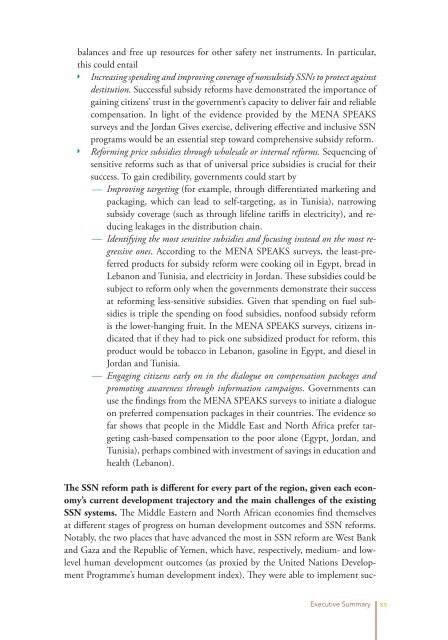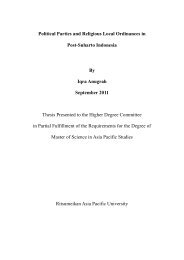You also want an ePaper? Increase the reach of your titles
YUMPU automatically turns print PDFs into web optimized ePapers that Google loves.
alances <strong>and</strong> free up resources for other safety net instruments. In particular,<br />
this could entail<br />
Increasing spending <strong>and</strong> improving coverage of nonsubsidy SSNs to protect against<br />
destitution. Successful subsidy reforms have demonstrated the importance of<br />
gaining citizens’ trust in the government’s capacity to deliver fair <strong>and</strong> reliable<br />
compensation. In light of the evidence provided by the MENA SPEAKS<br />
surveys <strong>and</strong> the Jordan Gives exercise, delivering effective <strong>and</strong> inclusive SSN<br />
programs would be an essential step toward comprehensive subsidy reform.<br />
Reforming price subsidies through wholesale or internal reforms. Sequencing of<br />
sensitive reforms such as that of universal price subsidies is crucial for their<br />
success. To gain credibility, governments could start by<br />
— Improving targeting (for example, through differentiated marketing <strong>and</strong><br />
packaging, which can lead to self-targeting, as in Tunisia), narrowing<br />
subsidy coverage (such as through lifeline tariffs in electricity), <strong>and</strong> reducing<br />
leakages in the distribution chain.<br />
— Identifying the most sensitive subsidies <strong>and</strong> focusing instead on the most regressive<br />
ones. According to the MENA SPEAKS surveys, the least-preferred<br />
products for subsidy reform were cooking oil in Egypt, bread in<br />
Lebanon <strong>and</strong> Tunisia, <strong>and</strong> electricity in Jordan. These subsidies could be<br />
subject to reform only when the governments demonstrate their success<br />
at reforming less-sensitive subsidies. Given that spending on fuel subsidies<br />
is triple the spending on food subsidies, nonfood subsidy reform<br />
is the lower-hanging fruit. In the MENA SPEAKS surveys, citizens indicated<br />
that if they had to pick one subsidized product for reform, this<br />
product would be tobacco in Lebanon, gasoline in Egypt, <strong>and</strong> diesel in<br />
Jordan <strong>and</strong> Tunisia.<br />
— Engaging citizens early on in the dialogue on compensation packages <strong>and</strong><br />
promoting awareness through information campaigns. Governments can<br />
use the findings from the MENA SPEAKS surveys to initiate a dialogue<br />
on preferred compensation packages in their countries. The evidence so<br />
far shows that people in the Middle East <strong>and</strong> North Africa prefer targeting<br />
cash-based compensation to the poor alone (Egypt, Jordan, <strong>and</strong><br />
Tunisia), perhaps combined with investment of savings in education <strong>and</strong><br />
health (Lebanon).<br />
The SSN reform path is different for every part of the region, given each economy’s<br />
current development trajectory <strong>and</strong> the main challenges of the existing<br />
SSN systems. The Middle Eastern <strong>and</strong> North African economies find themselves<br />
at different stages of progress on human development outcomes <strong>and</strong> SSN reforms.<br />
Notably, the two places that have advanced the most in SSN reform are West Bank<br />
<strong>and</strong> Gaza <strong>and</strong> the Republic of Yemen, which have, respectively, medium- <strong>and</strong> lowlevel<br />
human development outcomes (as proxied by the United Nations Development<br />
Programme’s human development index). They were able to implement suc-<br />
Executive Summary xv



